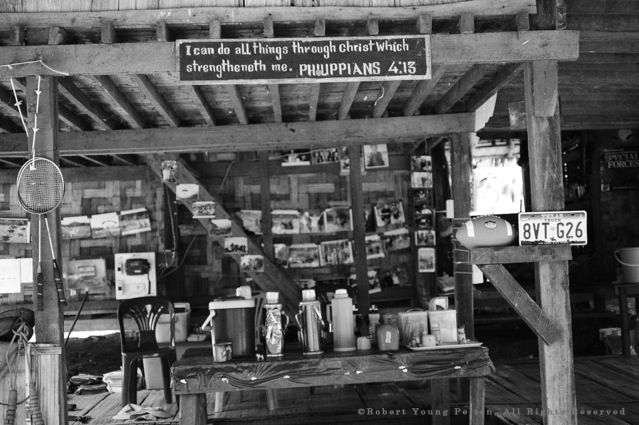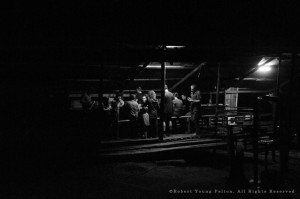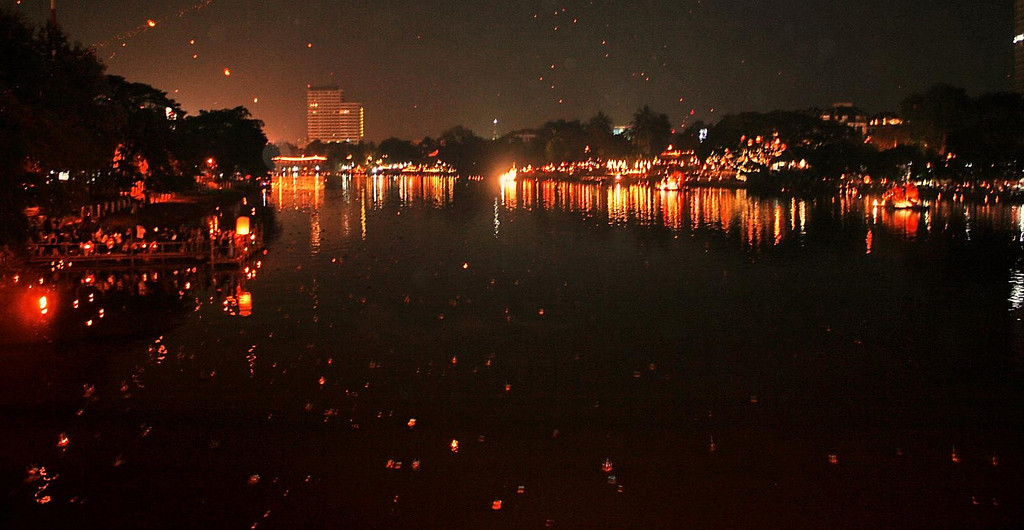Inside Burma’s Dirty War, Part II
by Robert Young Pelton
I ask Doug, the Father of the White Monkey, why he calls his operation “Free Burma Rangers.” Like many of Doug’s decisions, it is intuitive and simple. “I made up the name when I climbed Mt. McKinley, and I had to write down a name. Kind of like the Texas Rangers or the Army Rangers.” He started in 1997 with one local media team and now trains five-man teams from volunteers. They are trained in security, communications, media, medical skills and morale. But Doug makes the point that this is being done by the Karen, not him. Koala Bear, a small, hard-as-rock 37-year-old Karen commander, is in charge of training.
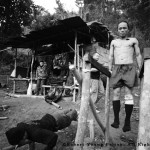 Doug has the unnerving habit of interrupting our interview with a prayer. “Robert, what kind of Christian are you? I need some prayer.” I don’t know what to say after seeing the godless wastelands of insurgency and terror in 36 wars. Without an answer, he prays for my success and the Karen. Then just as quickly pops back into interview mode. The Free Burma Rangers now have 15 different teams, and do two-month missions to document and help Karen that are attacked by the Burmese army. Volunteers spend four years inside FBR and then move on to military, support or political arms of the KNU. Currently he has 11 different ethnic groups at the camp, and even one Muslim. Doug estimates FBR burns through about $1 million a year, mostly donated from church groups. “We have 55 teams out there, but we are treading water. Help, hope and love is how they survive. We do our best to send out information, to help the people, stay with the people.” Looking to define it better, he then adds, “I cannot run away.”
Doug has the unnerving habit of interrupting our interview with a prayer. “Robert, what kind of Christian are you? I need some prayer.” I don’t know what to say after seeing the godless wastelands of insurgency and terror in 36 wars. Without an answer, he prays for my success and the Karen. Then just as quickly pops back into interview mode. The Free Burma Rangers now have 15 different teams, and do two-month missions to document and help Karen that are attacked by the Burmese army. Volunteers spend four years inside FBR and then move on to military, support or political arms of the KNU. Currently he has 11 different ethnic groups at the camp, and even one Muslim. Doug estimates FBR burns through about $1 million a year, mostly donated from church groups. “We have 55 teams out there, but we are treading water. Help, hope and love is how they survive. We do our best to send out information, to help the people, stay with the people.” Looking to define it better, he then adds, “I cannot run away.”
Although Doug is a devout Christian, who grew up in Thailand and whose parents are Baptist missionaries, he insists that no one is trying to change anyone’s religion here—though there is a distinct sense of religious zeal and devotion in the camps by both instructors and students. “We have been here seven years, have four other training sites and eight teams operating from the Indian side. Since I was five years old, I wanted to be a soldier and then missionary.” His dad was a missionary when Thailand was still rural and undeveloped. Dave was sent to a boarding school at age seven. “That’s when I gave my life to Jesus. I got dengue. I was crying under my pillow. I was alone and sick I asked Jesus to help. And I felt this warm love come over me.” Growing up in Thailand shaped him. He used to hunt, fish, hike and ride horses while his missionary father dug wells and built schools. This beautiful mountain landscape with raw rivers and pristine hills is also his home. He owns 150 acres and wants it to be a national park. He bought it for $1,500 after the owner’s elephant trampled the rice crop when he was a way.
Doug’s history is both religious and military. He joined the Army, then wanted more of a challenge so he went to Ranger school. Because of his Thai language skills, he then became Special Forces. “In 1992 at my ten-year point I could have gone CAG (Delta Force) or Defense Attaché but got married. I met a lady and she left me. We were both immature, selfish people.” Doug’s life seems to be a constant battle between success and failure.
We talk about the conflict of religion and military life. He tells me a story. “Robert, when I was 27 years old and I was a Ranger, we were preparing to overthrow the dictator in Surinam. My job was to take out a group of Cubans at Paramaribo Airport. Bad dudes. To get to them we were going to have to run a mile and a half with full gear and then call in coordinates for an air strike. I was supposed to give them a minute to surrender before calling it in. But good old Ranger Lieutenant Eubanks was going to run in and just let them have it. The operation never happened but later my commander, General Mayer heard this and said, “You were going to give them one minute weren’t you.” Doug was surprised that Eubanks had no problem killing dozens of people without hesitation. He said, “You may be in the army but you serve a higher force. I thanked Mayer. That’s when I learned that I serve something higher.”
The higher force, despite the military structure, has kept FBR funded by humanitarians, church groups and individuals. One day, instead of the normal PT that keeps them lean, they are practicing singing songs, throwing Frisbees and making each other laugh—a task to cheer up demoralized and abused villagers. Their weapons are whatever the students can beg, borrow, buy or scrounge. I saw less than a dozen very old M1s and AR 15s in the camp.
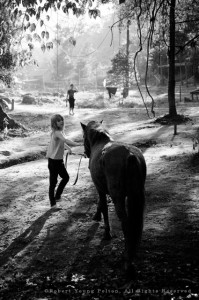 The other odd part of Doug’s life is that his wife, his two young daughters and son live with him. “We want to be together as a family. The locals asked us to bring our family. It shows them that here it is safe. There are no locks on the door here. The Karen break a candy bar and break it into five pieces. We have two days warning if the Burmese are on the move.” He is proud that his son Peter did a 30-mile movement at age four. I ask him about the new attack helicopters. He says he doesn’t think it will be a problem and then says, “Yeah, we should probably think about digging bunkers.”
The other odd part of Doug’s life is that his wife, his two young daughters and son live with him. “We want to be together as a family. The locals asked us to bring our family. It shows them that here it is safe. There are no locks on the door here. The Karen break a candy bar and break it into five pieces. We have two days warning if the Burmese are on the move.” He is proud that his son Peter did a 30-mile movement at age four. I ask him about the new attack helicopters. He says he doesn’t think it will be a problem and then says, “Yeah, we should probably think about digging bunkers.”
He said he was first mobilized to do something when he met the leader of the democratic party. “I met Aung Sang Syu Khi in the States in 1996. Even though she is a Buddhist, I gave her a bible and asked if I could pray for her. She said we need the prayers of people. I said I would be obedient until death. Just like the Lord says. Be obedient till death… So I am obedient until death.”
Doug has to balance life between being a mercenary, missionary and humanitarian. He makes it clear that no one here is making money, removing the mercenary stigma. He admits that there are plenty of foreigners behind enemy lines and the main sponsors do their best to coordinate. But he defends the need for military people in this war. “When the fighting starts, the missionaries all leave, the NGOs are next…but where are the Livingstone’s? We stay with the people under attack and will not leave them. We have no program of arming teams. We also prohibit offensive action. There is always room for people’s interpretation. It’s not a clear black and white.” Then he finishes by saying, “I love this God who speaks through the voice of God.”
“I don’t know what we are going to do next,” he says. “All I know is that I have 13 years of doing this. I have been in five close firefights… I like to fight, but God has never told us to do that. We have lost eight guys, half by sickness and half by combat.” The best perspective is the most banal, “Really the biggest danger is blisters, whacking your head or malaria.”
Doug and the FBR teams are the best single source of intelligence coming out of Burma. Thanks to his teams, the tactics of the Burmese Army are well documented and distributed via his website. “The SPDC mortars the village, chase them away, shoot and loot, then burn it and leave. The idea is to drive them into camps in Thailand or surrender. They kill the rest.” He has books of photos of murdered, raped and abused villagers. Once singular event that haunts him is a seven-year-old girl, raped, shot at point blank range
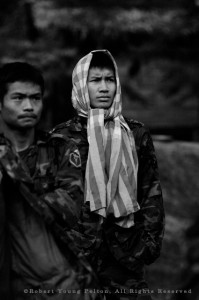 and left on the trail for the Rangers to find her.
and left on the trail for the Rangers to find her.
I ask Doug where God was on that day. He immediately asks. “Can I pray, Robert?” His eyes clench, he lowers his head and he prays out loud for the “strength and guidance to carry on”. He looks up at me “When you experience something like that, you want to kill them all, eat their bodies and then eat their shit and piss so there is no trace of them…. But the four of us [the FBR leaders] voted on it and said, no… we will be with the people and defend them.”
Doug wants me to understand we’re in an active war zone. “Burma is divided into 10% free fire or black zones, 20% brown or army controlled and 60% peaceful. We are in a black zone. We can recon the army within two hours. But you saw from those trails, that they don’t come here. The Burmese army doesn’t want to burn villages and murder villagers, but they are forced to. We intercept radio communications where a the major said if you want to be promoted you will burn the village if you don’t you will stay on the river.”
Part of fighting back is not only documenting the methodical human rights violations but also staying alive to do it. He views his position as a mouse between two elephants. “In 1997, the two governments of Myanmar and Thailand had meetings. The Burmese said these Special Forces guys were causing problems. Within an hour of the Burmese leader landing, the Thaïs arrested us. Thankfully, we were released. This Thai General said I fought for your release but God got you out. I believe in God. I don’t go for a hike and throw away my compass but God guides me. So we have a working relationship. They say don’t mention your name and never show your face in a publication and cover up all the white people who enter.” For some reason they don’t care about Christian publications. One group in the government supports his work because he keeps the Karen refugees inside Burma, the other group wants to shut him down and a third group doesn’t care either way. Today FBR is 250 people. I push him on what he really wants. He says “300 rifles?” He smiles. Doug realizes he must walk that line again. “We have zero secrets. No secret spook stuff, but if the CIA wanted to help us we would take it.
Later that day, one of the American military trainers is concerned that the story is about the “ethnics” and not “the white faces.” He was trained as a Marine Sniper and his wife is a midwife. “She was trained to bring people into this world and I was trained to take them out.” But I ask him why he is here. “There are only so many conflicts that are this right. We are only here to support them.”
At dinner, we talk again. Doug is still trying to get to the core of his motivation and his
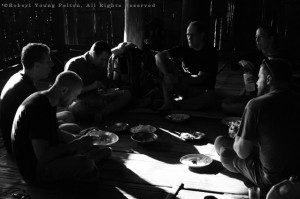 constant internal battle. “Injustice is someone who holds you down who is stronger. I am only 150 pounds, but how many times have I been unjust?”
constant internal battle. “Injustice is someone who holds you down who is stronger. I am only 150 pounds, but how many times have I been unjust?”
Dave constantly asks me to focus on the Karen and not on the gullawa. But it is clear that the outside support is one of the reasons why the Karen have held out so long. Villagers, dirty, tired and smelling of smoke and urine, sit patiently for the FBR medics to take care of them. It is up the western doctors to operate on a small boy, draining the pus out of his knee. The two doctors set up a makeshift operating area across from my mat and cut in without anesthetic.
Doug’s opinion of the foreigners is that unless they stay, fight and actually are there throughout the combat operations with the Karen they trained, they are just here on vacation. He also thinks that the Rambo-like mentality of many of volunteers, like the Americans who were detonating large explosive charges right on the border simply makes it more difficult.
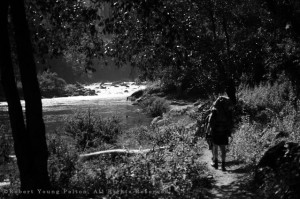 “The history of outside involvement probably began with Captain Hang, who was a veteran of the French-Indochina war. He was a legionnaire, Vietnamese and rose in France. He not only trained but he went and did the operations. Very tight. When I see some of Bo Jo’s men operating on the river, I can see Hang trained them.
“The history of outside involvement probably began with Captain Hang, who was a veteran of the French-Indochina war. He was a legionnaire, Vietnamese and rose in France. He not only trained but he went and did the operations. Very tight. When I see some of Bo Jo’s men operating on the river, I can see Hang trained them.
“A couple of more Legionnaires came in the French marines. They did well. By the fall of Mannerplaw in 1995, the easy access was gone. There were very few foreigners in here after that. Lots of fighting, travel was dangerous, nobody knew who to talk to. Before July of 2003 they were just across the river at Mai Salit under the cliffs, but the Thais told them to move or they would have to arrest them. You could come in a wheelchair. Wouldn’t even get your feet wet.” He points to the sheer green walls around us. “Now you have to walk.”
After a couple of weeks come and go, the pain from the walk has vanished. I am losing weight, eager to run up hills. I bathe every day in a jungle stream, eat rice and deer meat, go to bed at 8 p.m. and get into the rhythms of the jungle. The young men and women of the FBR have become friends and invite me to take part in their activities. It is clear that for someone looking for a cause, this place is like Mecca.
Before we leave the students surprise Rob and I. They hoist us above their heads, cover us in ash and dirt and then throw us in the river. Then they carefully wash us off, smiling and laughing at this simple ritual of acceptance. I suppose it’s a baptism of sorts. There are long speeches from both sides, crudely printed diplomas and earnest thank-yous, and then it is off to the green vertical hell for two days of walking back to civilization. But this time, it’s enjoyable and I’m a little wistful.
Nerdah Mya is probably the most famous Karen commander. Before I interviewed General Bo Jo and the other generals, they had not been interviewed by Western reporters for five years. Nerdah, by contrast, posted a YouTube interview a few weeks before our arrival. He can be seen and read about in dozens of publications or documentaries. I am intrigued and want to meet the most famous Karen rebel commander—the magnet for much of the controversy. Rob says back at his restaurant, “If Nerdah has any foreigners there, he will trot them out like it was the Westminster Dog show.” After a few phone calls we are directed to drive south and meet with “Gary.”
Gary meets us at 4:45 a.m. outside of his hotel. He is short, heavy eye browed, bullet headed and speaks in a broad Australian twang. We quickly learn he has an obsessive love of providing painfully accurate directions even to the gas station. I figure Gary for a security contractor on leave from Iraq.
We meet a film crew that is also going in. A disheveled Frenchman appears out of a van and keeps asking us who we are. A former French marine turned fixer and photojournalist, he is there to make sure the BBC get in and out without a hitch. In our conversations with Nerdah’s people we had arranged to go in, and we’d been told there might be an ABC or BBC crew along as well. “Nerdah thinks everyone is the BBC,” quips Rob. It turns out it actually is the BBC crew here to cover a historic event.
Unlike our death march to visit the FBR, Nerdah’s soldiers simply drive down a rutted road between huge limestone spires, and suddenly we are in Burma. At the checkpoint a thin fair-haired, middle-aged westerner in military garb stares intently at us. We are in a hurry not because there is fighting but because there is a peace ceremony between the DKBA and KNU. We arrive just as two lines of armed Karen fighters shake and hug.
The
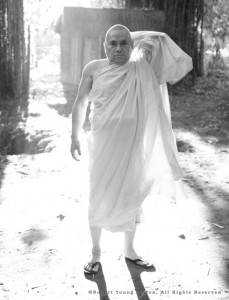 rest of the sweltering day is filled with droning speeches, except for a speech by an elderly monk, Rambo. The constant waves of laughter help him work the crowd like a Karen Rodney Dangerfield. Rambo is famous for showing a few Karen rebels how to hitch a ride: They stood beside a road trying unsuccessfully to flag down a driver when Rambo borrowed their gun fired a few shots at passing cars until one stopped. He then handed the gun back, and said, “That’s how you stop a car.”
rest of the sweltering day is filled with droning speeches, except for a speech by an elderly monk, Rambo. The constant waves of laughter help him work the crowd like a Karen Rodney Dangerfield. Rambo is famous for showing a few Karen rebels how to hitch a ride: They stood beside a road trying unsuccessfully to flag down a driver when Rambo borrowed their gun fired a few shots at passing cars until one stopped. He then handed the gun back, and said, “That’s how you stop a car.”
Nerdah makes a speech first in Karen and then in English for the benefit of the BBC. On the tail end of election coverage he has brokered the Buddhist Karen troops switching sides from the Myanmar government to join with the Christian Karen. They shake hands again for the benefit of the BBC crew and the few unshaven stringers. “Today is the reunification of the country,” he says. “The Burmese will respect our freedom.”
Troops from both sides wear garlands of flowers and on command hug and shake hands. A Buddhist monk blesses then and a priest officiates. Children sing as speeches are made. Colonel Nerdah greets us and welcomes us. A new DKBA flag flies next to the tattered KNLA flag above Krep Po Ta village.
As Nerdah poses for pictures, he greets me in very slightly accented American English. “We must psyop them. After the election we must take the initiative. The Burmese army is waging psychological warfare against us so we need to show that we are together. Aung Sung Syu Kyi cannot do it by herself. We need to forgive and forget. We show love and forgiveness.”
That night back at the camp we have dinner. What made this candle light conversation unnerving was not the thump, thump, thump of distant mortars or even the mix of legless veterans and childlike soldiers that huddled around us, it was the constant smile and politeness of our host. This is ground zero for much of the interest by foreigners fighting inside Burma.
Nerdah was the mentor to Thomas Bleming and many other Western volunteers turned mercenaries. The reason becomes abundantly clear. Nerdah despite his high rank is one of us. A favored son of the Karen’s most famous commander who spent years in the US.
Nerdah went to school in the Napa valley area of California and even has a pilot’s license. He too has dreams of an air force, more volunteers, basically anything to push back the relentless murder and pressure of the Burmese Generals. But his ideas are likely to remain dreams. He shows me his village—once burned and now rebuilt by Populi—and urges me to come back anytime. The BBC is done and is on the phone looking for “abused refugees” from the recent fighting to complete their story. They finally have to film them backlit. Its time for Rob and I to leave the war zone and return to “civilization” a short drive back.
When we are done with Nerdah he appears in civilian clothes and is eager to get home to his three daughters and wife. Military commander has become urban commuter.
We are back at Rob’s restaurant in the small bucolic town. As the customers move inside from the rain, Rob and I have gin and tonics over a spectacular pad Thai. Rob is careful on how he lays out the way things work and the people that flow through here.
The towns along the border are full of NGO workers with ponytails and earrings. Very few go “inside.” Fewer take up arms. One man who did is Oregonian, Robert Erhausen. It’s opening night at his new pizza place on the river. He has a couple of tables. He stops making pies long enough to sit and talk. When I point out the sparse attendance he says, “It’s Ok. This place will make money. It’s a soft opening.”
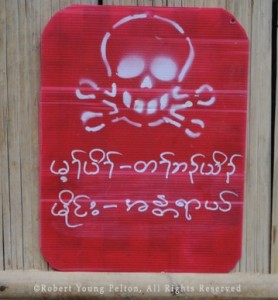 Erhausen is the grandfather of the foreign clique. And runs the Displaced Persons Action Committee, supports the Safe Haven Orphanage, and now trains and supports seven de-mining teams who work with wands to clear mines. He doesn’t look 63 years old, but he joined the US Marine Corps at age17 and fought in Vietnam, working with the Nung tribesmen in the Central Highlands.
Erhausen is the grandfather of the foreign clique. And runs the Displaced Persons Action Committee, supports the Safe Haven Orphanage, and now trains and supports seven de-mining teams who work with wands to clear mines. He doesn’t look 63 years old, but he joined the US Marine Corps at age17 and fought in Vietnam, working with the Nung tribesmen in the Central Highlands.
“I first came here off and on 14 years ago,” he says. Like many of the foreign volunteers, he came through Nerdah and eventually decided to stay. Rob was once connected to Baptist groups and ended up commanding a division of Karin soldiers. “I took over Ben Shipley’s old regiment. Ben was never in the military. He was doing drugs and went nuts. Started firing an AK and was shipped when the 7th brigade was overrun.”
Erhausen clashes with Doug because he now works with the government-backed Buddhist DKBW as well as the Christian KNLA. Erhausen’s take is that Doug is good on tactics but he’s not good on strategy. He applies that criticism to the KNLA. “It’s a business for the Generals. On both sides. They even give back weapons when they take ground from the government,” he says. He eventually ended up training General Bo Jo’s Special Forces but he senses that this war will not end well.“ I went to a meeting with the Generals and said, ‘It looks like you are losing a lot of real estate. What happens when you lose?’ They said, ‘we will pray.’” He shakes his head. “They are like the North American Indians at the end of the West. They’ll just take up the Ghost Dance . The Karen Generals are waiting for the second coming.”
He is getting less idealistic and more pragmatic. Even the pizza parlor is a better way to fund his activities. “If it weren’t for us they would have no medicine or food inside. I have fed up to 10,000 people.” Erhausen is interrupted by the waitress—there are more pizzas up.
I ask him about the foreigners. “A lot of people go home after a couple of years because they get disgusted.” He thinks back, trying to help yet another reporter with a story on mercenaries. “There were the Germans who paid to shoot people.” He offers but then thinks, “But it’s not something worth talking about.”
A briefing document shows that the end may be sooner than the second coming. The
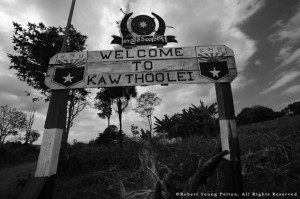 Burmese Generals have been eager students of how Sri Lanka successfully ended its 26-year-old war. They simply kept the media out and crushed the Tamils with overwhelming force. The Burmese now have built three-dozen new military bases, ploughed new roads and purchased 62 assault helicopters in preparation for what may be the final battle. The election was simply one item on a checklist to show that the “free and democratic” nation of Myanmar was simply eliminating a troubling insurgency. A campaign of infiltration, assassination, assault and assimilation is expected to begin this year. At that point, the war will be over. The foreigners have lit up the war in Burma, but one by one they flicker and then go out.
Burmese Generals have been eager students of how Sri Lanka successfully ended its 26-year-old war. They simply kept the media out and crushed the Tamils with overwhelming force. The Burmese now have built three-dozen new military bases, ploughed new roads and purchased 62 assault helicopters in preparation for what may be the final battle. The election was simply one item on a checklist to show that the “free and democratic” nation of Myanmar was simply eliminating a troubling insurgency. A campaign of infiltration, assassination, assault and assimilation is expected to begin this year. At that point, the war will be over. The foreigners have lit up the war in Burma, but one by one they flicker and then go out.
Waking back from Erhuasen’s, Rob seems to have forgiven Tookie, his girlfriend. When we returned from the jungle he was furious that a giant karaoke machine had appeared in his restaurant and that none of his hired help could find cigarettes.
It is the festival of loy krathong, and it occurs on the night of the full moon. Thais launch their krathongs to carry their dreams and to float away their sorrows. Others release khom fai, paper kites, lifted into the sky by a burning wick. The luminescent balloons float ill fortune away. Rob and Tookie light a flickering balloon and wait for it to rise. It gently sways and then lifts. It climbs until it is just a speck, then catches fire, and flares brightly. Then it is gone.
The post Inside Burma’s Dirty War, Part II appeared first on Dangerous Magazine.
Leave a comment
Comments will be approved before showing up.
Also in Dangerous Magazine
General Dostum and 12 Strong: THE LEGEND OF HEAVY D AND THE BOYS
This article on ODA 595, General Dostum, John Walker Lindh and the battle at Qali-i-Jangi was originally published in the March 2002 edition of National Geographic Adventure THE LEGEND OF HEAVY AND THE BOYS By Robert Young Pelton The Regulators flew in from Uzbekistan at night on a blacked-out Chinook helicopter. They landed near a mud-walled compound in the remote Darra-e Suf valley in northern Afghanistan. As they began unloading their gear, they were met by Afghans in turbans, their faces...
The post General Dostum and 12 Strong: THE LEGEND OF HEAVY D AND THE BOYS appeared first on Dangerous Magazine.
Finding Bergdahl – The Final Chapter
In the fifth and final chapter of this saga we go deep inside the back room negotiations to release Bergdahl and the controversy that would await him after his release. by Robert Young Pelton By late 2013 Bowe Bergdahl had been a prisoner of the Haqqani’s in Pakistan for almost half a decade. According to Bergdahl’s account, he fought back , he refused to convert, refused to eat cooked food (an insult to Pashtuns) and he refused to bathe. He escaped...
The post Finding Bergdahl – The Final Chapter appeared first on Dangerous Magazine.
Down The Gambia Part One
By Will Grant Originally posted on November 10, 2012. In a remote corner of West Africa, the River Gambia remains one of the last major undammed rivers on the continent. Flowing from a small rivulet in the Guinean highlands, known as the Fouta Djallon, the river runs northwest and west for 733 miles to its mouth at the Atlantic Ocean—a six-mile-wide estuary of mangroves, sand bars, and braided streams. In what may be the first source-to-sea descent of the river,...
The post Down The Gambia Part One appeared first on Dangerous Magazine.

